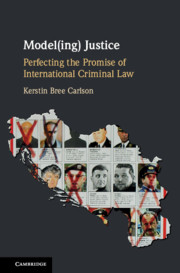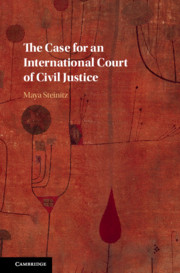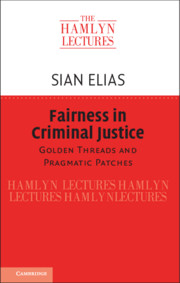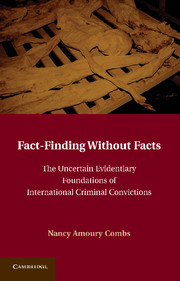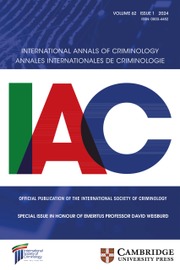Model(ing) Justice
The International Criminal Tribunal for the former Yugoslavia (ICTY) was the first and most celebrated of a wave of international criminal tribunals (ICTs) built in the 1990s and designed to advance liberalism through international criminal law. Model(ing) Justice examines the practice and case law of the ICTY to make a novel theoretical analysis of the structural flaws inherent in ICTs as institutions that inhibit their contribution to social peace and prosperity. Kerstin Bree Carlson proposes a seminal analysis of the structural challenges to ICTs as socially constitutive institutions, setting the agenda for future considerations of how international organizations can perform and disseminate the goals articulated by political liberalism.
- Proposes a new theoretical model for international courts as transitional justice mechanisms
- Identifies structural paradoxes in international criminal law doctrine and institutions
- Offers a summary and a wider 'so-what' of ICTY practice
Reviews & endorsements
'Whether you are a true believer or a cynic about the ability of criminal justice to deliver on its promises, you need to read this provocative, in-depth, study of the impact of the International Criminal Tribunal for the Former Yugoslavia.' Roger S. Clark, Board of Governors Professor, Rutgers Law School, New Jersey
'Can international criminal justice achieve peace and accountability? This new book tells us when and how these new tribunals can deliver on their ambitious promise.' Ruti Teitel, Ernst C. Stiefel Professor of Comparative Law, New York Law School
'Model(ing) Justice: Perfecting the Promise of International Criminal Law is a unique exploration of the ICTY. Meticulously, Kerstin Bree Carlson shares her astute observations of the ICTY from the past two decades and draws compelling lessons for the future of the project of international criminal law.' Immi Tallgren, Senior Lecturer of International Law, University of Helsinki
Product details
November 2018Hardback
9781108417693
258 pages
235 × 156 × 18 mm
0.48kg
1 b/w illus.
Available
Table of Contents
- Introduction: using courts to heal countries: transitional justice and international criminal law
- Part I. Using Courts to Heal Countries: Transitional Justice and International Criminal Law:
- 1. Nuremberg defines our time: the promise of international criminal law
- 2. Non-derogation and international criminal law: situating the ICTY
- Part II. Applying International Criminal Law's Paradoxes to Paradigmatic International Criminal Law Doctrine: Post Rule of Law Procedure, and Illiberal Theories of Culpability:
- 3. Post rule of law: international criminal procedure and its evolution before the ICTY
- 4. When non-derogable principles meet criminal liability: the justice problem of JCE
- Part III. Narrative and Discourse:
- 5. History, trials, and collective memory
- 6. Failures in reconciliation: the lost opportunity of Milan Babic, 'reformed nationalist'
- Conclusion, towards 'ICL 3G'.

